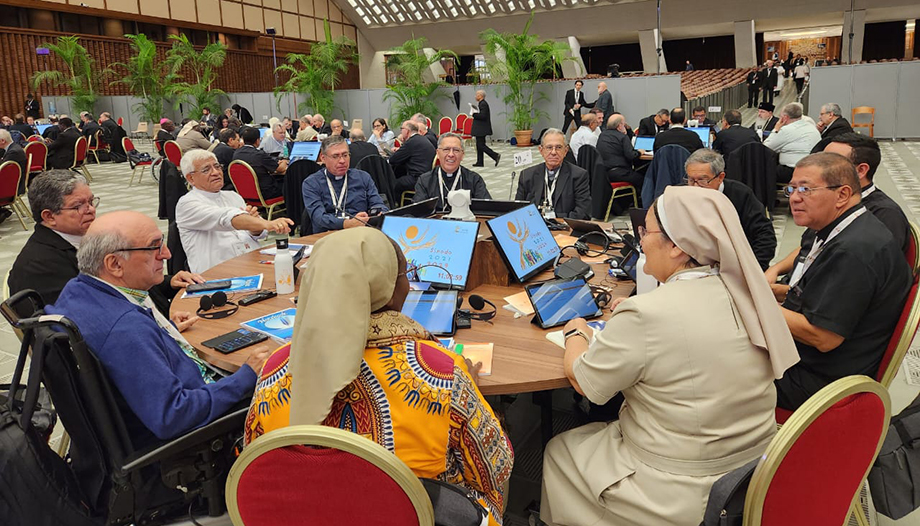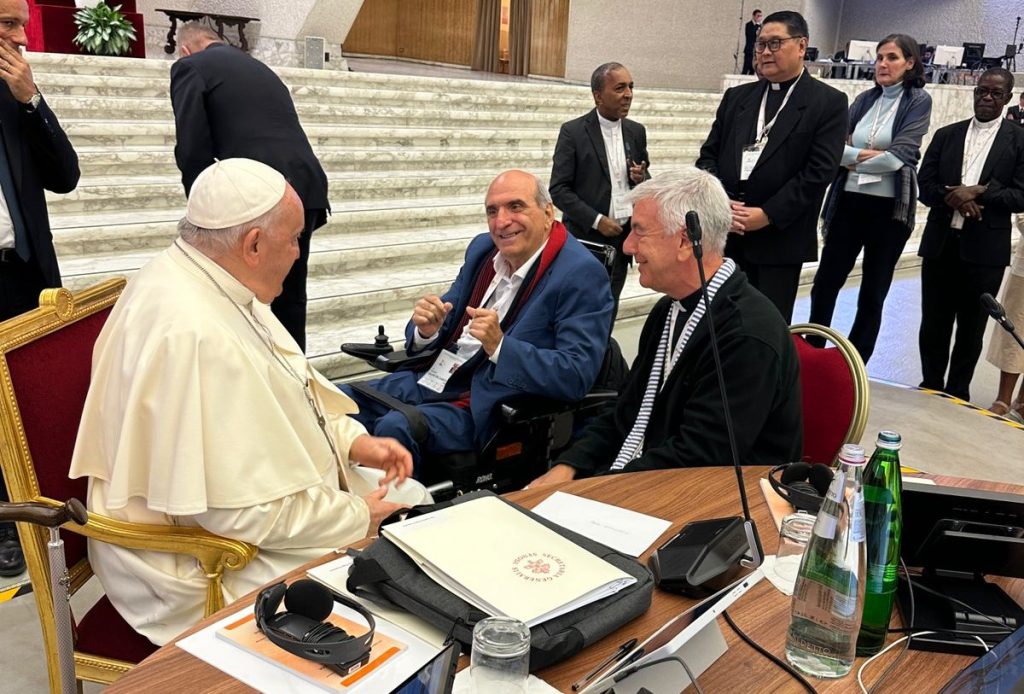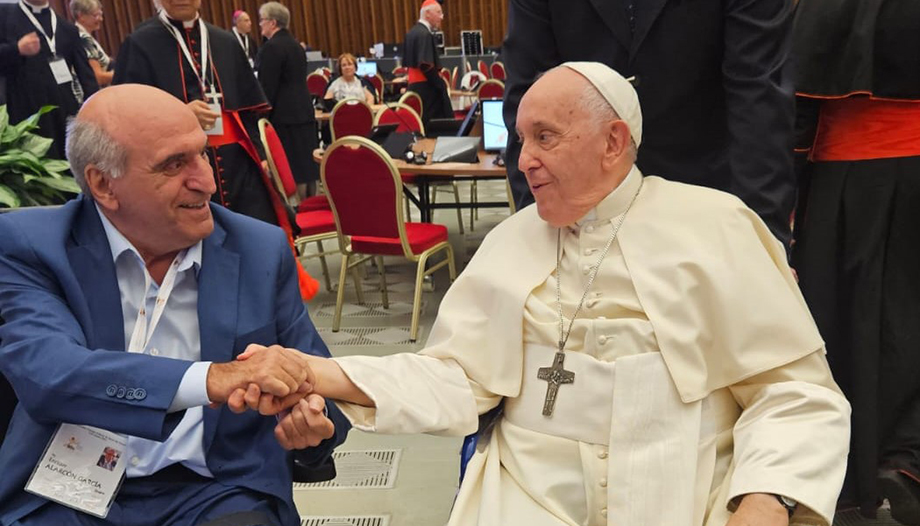




















"It is the first time that, in a SynodA person with a great disability can meet at the same table with a bishop or a cardinal and, in addition, actively participate in working sessions with the freedom of the children of God," Enrique Alarcón told Omnes in a wide-ranging statement in which he spoke freely about his impressions of these weeks of work with Pope Francis.
For Enrique Alarcón, president of CLM Inclusive Cocemfe, former president of Fraterwhich has already granted some extensive interview a Omnes, participating in this Synod has been "an event from day one". In this last week of the SynodThe Synod of the Synod of Bishops of the Church, which has seen itself since the Second Vatican Council as the People of God, is called today to a profound personal and structural conversion"; that "this inclusive Synod represents a paradigm shift in the Church", and that "this is here to stay, even to expand the presence of the laity, especially women".
Furthermore, Enrique Alarcón traces the path: "The period until October 2024 implies, for everyone, a deep work and community discernment, in which "clericalism is one of the great problems to be faced and discerned". "The active presence of the laity is urgently needed because it is not enough to criticize or wait for everything to be "given to us". Synodality requires moving forward together, sowing and sharing experiences," he said.
How are you living this Synod? Your experience of communion and dialogue.
- Participating, as a full member, in the XVI Assembly of the Synod, and as a lay person, becomes an event from the very first day. Even more so if we consider that it is the first time that in a Synod a person with a great disability can meet at the same table with a bishop or a cardinal and, in addition, actively participate from the freedom of the children of God in working sessions that will have a great impact on the life of the universal Church.
This already represents a point of view that is different from the work meetings in any other part of the Church, where only the ecclesiastical hierarchy exercises decision-making capacity. In this unique Synod of Bishops, lay people, laywomen and consecrated life also take the floor and our contributions are being collected.


What do you think has been the differential point of this Synod, what moments have stuck out to you the most?
- I have been surprised by the spirit of harmony and fraternity that we have been experiencing from the very first moment. Not once have I appreciated a gesture of rejection or distancing for the fact of being a lay person. Nor because of my situation of great disability, where some paternalistic or painful treatment could be expected. But I must also say that this human closeness should become a reality in the ordinary life of our parishes and dioceses, especially among the laity and the ministers of the Church.
I was also impressed by the way of working: the "round tables". A true space of equality and respect in welcoming what was expressed by others. All at the same level, without any distinction other than being members, brothers and sisters of the People of God.
But, above all, what moved me most was the methodology of "listening in the Holy Spirit" based on silence, prayer and mutual listening so that together, we can intuit, accept and discern what the Spirit inspires.
Will this new way of proceeding fit in the Church?
- It should take hold. The Church, which has seen itself since the Second Vatican Council as the People of God, is called today to a profound personal and structural conversion. Starting from being and living in communion, we will be able to revitalize the mission to which we have been called. And this, preferably, where the heart of the world beats: among our brothers and sisters affected by injustice, violence and suffering.
It will also depend on how we involve ourselves and how we present the synodal process in our particular contexts from this first part of the XVI Assembly. The period until October 2024 implies, for all of us, a profound work and community discernment, being clericalism, individual and structural, one of the great problems to face and discern. The active presence of the laity is urgently needed because it is not enough to criticize or wait for everything to be "given to us". In any case, let us not remain lying under the tree waiting for the ripe fruit to fall. Synodality demands that we move forward together, sowing and sharing experiences.
You just spoke of a "very special Synod". Can you elaborate on that?
- The first great surprise of this Synod was the decision of Pope Francis to consult the entire People of God, insisting, moreover, on wanting to listen to the voice of the last, of the excluded. An example of this can be seen in the special consultation for people with disabilities. We received that event with immense joy and at the same time perplexity.
On the other hand, the "guests to this new Pentecost", lay men and women, consecrated life and non-bishops, even a layman with a great disability. All together sharing in synodality and from an authentic fraternal closeness. We trust that this synodal experience will bear fruit in dioceses and parishes.
Finally, I repeat what I said before, the methodology of "listening in the Spirit" and symbolically reflected in the round tables. Unfortunately, we live in a polarized world, enclosed each one in "my truths" by which they separate and confront each other. This reality also affects the Church. Hence the urgent need for a synodal methodology that urges us to look at the truth that God the Father reveals in Christ and asks us to focus on the Beatitudes as a way of life.
Any interventions that have touched you more deeply?
- The interventions, starting from concrete realities, show our own fears and hopes, but also a deep desire for a living Church, in a synodal key, that offers a response to the challenges that today's culture and world require. But, without a doubt, what touched my heart deeply was the fraternal presence at the Synod of representatives of Churches and peoples marked by war, violence and the tragedy of so many refugees.
An anecdote of the Pope that has impacted you the most.
- Anecdote as such I could not say now. However, the presence of a Pope in a wheelchair never ceases to impress me. His visibility is a sign of the spiritual strength hidden in weakness. His apparent fragility is also a sign that questions the arrogance that we so often employ in the world and in the Church. And so we easily forget that our mission is to serve in humility and simplicity and, in a special way, our most vulnerable brothers and sisters. For those of us who make up Frater (Christian Fraternity of Persons with Disabilities), it is a natural reason for us to be inclusive, we are and we feel that we are "a Church for everyone, everyone".
What are women and, in general, lay people contributing? You are.
- First of all: visibility. This inclusive synod is a paradigm shift in the Church. I am fully convinced that this is here to stay, even to expand the presence of the laity, especially women. The contribution of women in the Church, as we all know, is fundamental. On the one hand, to recognize their presence, generous dedication and creativity, without them many churches would be empty. On the other hand, to say that they are one of the fundamental pillars that sustain the Church at all levels. Their reflections and theological contributions open paths of synodality and are an example of spiritual integrity.
The laity, in general, must deepen our ministerial vocation, fruit of our Baptism, and strengthen our role as defined in the Social Doctrine of the Church. If we demand co-responsibility, it should not be to clericalize ourselves more than many lay people already are. The development of this Synod entails the living presence of the laity for a missionary Church in today's changing world.


On listening to the Holy Spirit, and among yourselves, is there any idea that has particularly stuck with you?
- It is all too frequent to confront one's own ideas with the aim of imposing oneself and gaining power. Even more so when, as now, the Church and society suffer the damage of polarization. The Lord never tires of repeating to us that "let it not be so among you"; however, at times we lack practice and tools for an empty listening where we welcome the other person and, together, discern from the Word and not from our own prejudices and interests.
One of the things that has impacted me the most in the methodology of listening in the Holy Spirit is to start from equality and equal value in the word. That is to say, not to start from great speeches, but from the same and brief time of exposition. The circular scenario favors the dignity of each and everyone, without distinctions or hierarchies.
On the other hand, the absence of debate in which to reinforce one's own ideas and theses, and where the focus falls on what is expressed by others, favors an emptying that, interiorized through prayer and silence, motivates the emergence of humility that facilitates opening oneself to the intuition of the Holy Spirit. It is to navigate towards the truth, avoiding those islets that isolate us and shelter us in our mediatized truths.
It is not an easy path, but it is the path of communion. With co-responsible participation we will open ourselves to the evangelizing mission to give reason for our being and belonging to the People of God. It is the Lord who tells us: go and evangelize.












